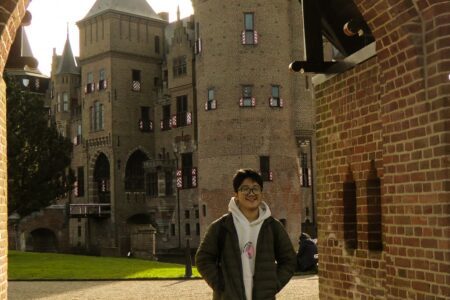
“If you don’t sacrifice for what you want, what you want becomes the sacrifice.”
These aren’t the words of a seasoned professional or a motivational speaker, but of 18-year-old Shambhavi Polavarapu from Telangana, Southern India.
At 17, she packed her bags and left home to study a Bachelor’s in Information Technology, specialising in cybersecurity, at Deakin University in Melbourne.
A year earlier, she did what few other 16-year-olds would want to do: networking on LinkedIn.
Her moves are rare and bold for someone so young but necessary.
Cybersecurity is a tough field — one that challenges even the most experienced.
Sham is aware of this, even embracing the challenges.

While studying cybersecurity, Sham joined a panel called “How to be an HD student” with lecturers and course leaders. Source: Shambhavi Polavarapu
How to succeed in the cybersecurity industry
As the world grows more digital, cybercrime feels almost unavoidable.
That’s why the demand for skilled cybersecurity experts is growing, with employment in the cybersecurity field expected to grow by 33% from 2023 to 2033.
Sham’s wanted to study information systems and cybersecurity since she was in high school and so she started preparing to get into the cybersecurity industry early.
In 9th grade, she researched study abroad options with the help of her greatest supporter: her father.
“I love my dad so much. He was the one who researched education systems in different countries and helped figure out how we could afford my studies abroad,” she shares.
Together, they chose Australia for its tech industry. It is projected to grow by 8.7% in 2025 to reach AUS$167 billion, with the software sector expanding by 13.4%.
She got outside help too.
Sham connected with Sarah Young, Microsoft’s Principal Security Advocate. She told her that in a challenging yet highly rewarding field like cybersecurity and tech, networking is the best way to get started.
And so in 11th and 12th grade, Sham did what most people her age would balk at doing: she got busy on LinkedIn.
“I just wanted to find a mentor, chat with people in the industry, learn more about how it all works, and maybe get some guidance on the paths I could take,” she says.
From these conversations, she had one major takeaway: cybersecurity is not a beginner-friendly field. Even entry-level roles often require several years of prior IT experience.
Many had advised her to start in a general IT role first, as it would make transitioning into cybersecurity easier later.
So she made her choice. “I’ll study IT,” she says. “It’s a broad field, covering web development, networks, hardware, and cybersecurity basics. It opens up more opportunities for me at the start.”
She’ll work her way up, building experience before pivoting to cybersecurity.
“If you specialise in cybersecurity too early, you limit yourself,” she says. “I don’t want to create that barrier for myself. I want to make sure that I’m able to do cybersecurity in the future in the way I want to.”

Studying cybersecurity in Melbourne changed Sham’s life. She went on many adventures with her best friend, Aditi Mishra, whom she met there. Source: Shambhavi Polavarapu
Which university is best for cybersecurity students?
Sham brought the same go-getter mindset when choosing where to study cybersecurity.
She shortlisted a few universities that offered strong cybersecurity programmes and then went a step further: she talked to students who were already there.
“I reached out to them through personal connections — friends of friends, anyone I could find,” she explains.
She also looked up YouTube videos where students shared their day-in-the-life experiences and reached out to them on social media.
For Deakin University, she spoke to six students before making her decision.

As a cybersecurity student, Sham joined the Student Partner Co-Lab, a policy revision think tank where students shared ideas to improve Deakin’s graduate learning outcomes. Source: Shambhavi Polavarapu
Discipline first. Regret never.
Sham’s determination was shaped early on by her unique upbringing. During high school in India, she joined the National Cadet Corps (NCC), a programme that provides basic military training to students.
“My dad always wanted me to be sporty,” she says. “But I was more of a nerd which is why he made me join the NCC.”
It felt like something out of a military drama. “Cadets had to march in a perfectly straight line, and if you got it wrong, you were punished with push-ups and planks,” she recalls.
Nights in tents were tense. Instructors would wake cadets at random hours in the night. Half-asleep and shivering in the cold, they had to rush outside and stand in formation.
It was tough, but it taught her a lesson she still carries today: the value of discipline.
“I tend to procrastinate but NCC made me realise that to be productive, you have to know what to prioritise and when to do it,” she says.
That mindset now guides her daily choices. Whenever she’s torn between going out or studying, she asks herself: “How will it affect my career? What am I gaining professionally?”
For example, it’s the weekend and there’s a fun trip planned and a tech conference happening at the same time.
Most students wouldn’t think twice; they’d pack their bags for the trip. But not Sham.
“If I’m really tired and need a break, I’ll go on the trip,” she explains. “But if not, I’ll attend the tech conference. This is because I’ll get to network with experts and learn from people who can help my career.”
That’s something she’s not willing to sacrifice. She’s even skipped a family trip for a conference.
“Today is the youngest and most energetic you’ll ever be in the next five years,” she says. “You have to put in the effort now. Too many people don’t start early — and they regret it later. I won’t.”
But choosing growth over comfort has its downsides. Watching loved ones go on without her, missing key moments — hurts.
And there are times the pressure gets too much, leading to burnout.
Again, Sham turned to her mentors who advised her that hustling has its place, but it needs balance.
“I still struggle with that,” she admits. “But I’m learning. You have to take care of yourself too.”








 Bootcamp" />
Bootcamp" />

